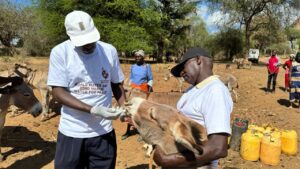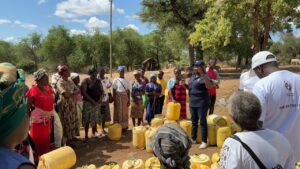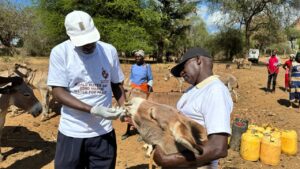The Donkey Sanctuary Kenya celebrated the World water day by raising awareness of the profound impact of working donkeys on female empowerment in rural Kenya.
In addition areas, where access to clean water is often a challenge, these resilient animals play a pivotal role in transforming communities. Globally, a staggering 200 million hours are reportedly lost by women and girls collecting water every day (UNICEF: NEW YORK/STOCKHOLM, 29 August 2016) (WaterAid, February, 22, 2024). In many parts of rural Kenya, women and girls are traditionally tasked with the arduous responsibility of fetching water, often walking long distances multiple times a day. This not only consumes a significant portion of their time but also limits their opportunities for education, work, and personal development. However, by recognising the value of working donkeys and improving their welfare, this narrative can begin to change.

The Donkey Sanctuary Kenya is in the rural village of Nuu, Mwingi, where these hardworking animals are relied upon to transport water from distant sources to households, alleviating the burden on women, who would otherwise have to carry heavy loads over long distances.
Donkeys’ strength and resilience make them well-suited for Nuu’s challenging arid terrains. Their contribution enhances water accessibility, improves overall community wellbeing, and fosters harmony between communities who unite around the fair and sustainable use of water –which ties in with this year’s theme Water for Peace’.
The Donkey Sanctuary Kenya’s Country Director, Solomon Onyango, added ;“Access to safe water, sanitation and hygiene is a basic need for the health and wellbeing of both humans and donkeys. There are over 3,000 working donkeys in Nuu, many of whom make a daily round trip of up to 9km, carrying 80kg of water on their backs. However, like many of the country’s 1.2 million donkeys, their critical role is often overlooked, and their welfare is not prioritised.
“We know when working donkeys are poorly fed, overworked or suffer illness and disease, they cannot achieve their productive potential and it is not only the donkey that suffers but the whole community.
“Today we are providing free health checks and veterinary services for Nuu’s working donkeys, and offering advice to owners on how best to care for their donkeys, so these wonderful animals can continue to reduce the physical burden on women, enabling them to collect more water in less time, allowing for increased productivity in other aspects of their lives.”
The Donkey Sanctuary is an international animal welfare charity dedicated to improving the lives of donkeys and mules worldwide. We provide lifelong care to over 7,000 donkeys in the UK and Europe, and reach many more globally through our international programmes and partnerships. Our colleagues are based all over the world and we work with a global network of partners, NGOs and governments, who share our vision of a world where every donkey has a good quality of life.
The Donkey Sanctuary has been working in Kenya since 1987, where our mission remains to improve the welfare of donkeys and, in doing so, help safeguard the livelihood of millions of people who depend on donkeys for their everyday sustenance.








